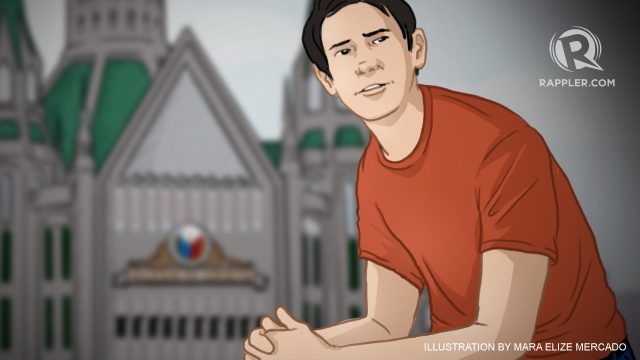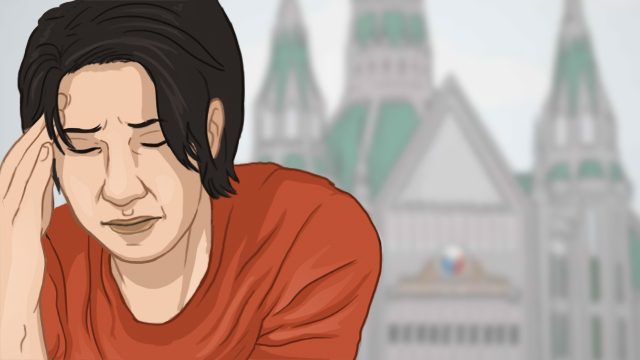SUMMARY
This is AI generated summarization, which may have errors. For context, always refer to the full article.
In this edition of Clinical Notes, clinical psychologist Margarita Holmes delves deeper into the issues raised by a Two-Pronged reader who is struggling with the idea of leaving Iglesia ni Cristo. Read on to see what she and other readers have to say.
 In our April 19, 2015 Two Pronged column, “Leaving the INC,” I promised to write more about the reason cutting ties can be more devastating for the child rather than for the parents, despite that old Filipino belief “Hindi matiis ng mga magulang ang anak.” (Parents cannot stay angry at their children) This is it, my third ever Clinical Notes for rappler.com
In our April 19, 2015 Two Pronged column, “Leaving the INC,” I promised to write more about the reason cutting ties can be more devastating for the child rather than for the parents, despite that old Filipino belief “Hindi matiis ng mga magulang ang anak.” (Parents cannot stay angry at their children) This is it, my third ever Clinical Notes for rappler.com
I waited to write this until now because I wanted to make sure that most (if not all) would have had the opportunity to say all they wanted to about the letter (and our answer) – and sometimes one needs time and space to be able to accurately put into words what it is one truly feels.
With its 236 comments and over 8,000 shares, it seems safe to assume that “Leaving the INC” triggered all sorts of different reactions in all sorts of different people. An overwhelming majority of the comments were about religion in general, but also about INC in particular.
The irony is that I didn’t consider Diego’s concerns to be religious at all; religion was merely the battleground where it manifested itself.
I doubt I would be presumptuous enough to talk about the worthiness (or unworthiness) of a particular faith per se. Many of you also picked up on this.
How one feels about one’s faith – or, more to the point, one’s spirituality (as opposed to any organized religion) – is too deep and too private for us to comment on after just one letter from a person. How one relates to one’s God is too intimate a concern to respond to without serious study and many more conversations with the person.
So if the issue I was responding to was not religion, what was it then?
Since Jeremy and I do not discuss our answers until after we’ve written them, let me speak for myself: I was responding to a person who had been raised to accept what his parents said 100% and to be dependent on certain things (and it just so happened that in this case it was religion) and who now wanted to break free from that dependence.

Earl Inocencio hit the nail on the head when he commented: “You’re not alone in walking such crossroads in life. It happens to everyone else, even to things irrespective of faith and religion like marriage, parenthood, careers, social and emotional relationships and a whole lot more …in the end, it is you, with your moral ethics and freewill that should prevail.”
One of the commentators scoffed and said all that Diego really wanted was permission, not counseling. But giving permission is a valid level of intervention in therapy, in and of itself.
Nowhere is this more evident than in the PLISSIT model (of therapy), which has 4 levels of increasing intervention related to what kind of and how much help is given to a client. These are: Permission (giving) Limited information, Specific Suggestions and Intensive therapy.
One of the more important skills a therapist must have when using the PLISSIT model is knowing the best level of interaction a client needs. To try and give him intensive therapy, when all he needs is permission to explore what was once considered out of bounds, is a waste of the client’s time and an insult to his readiness to address issues that he can handle.
A therapist must also train in discerning what aspects need permission as opposed to condoning behaviors that are not in the therapist’s remit to encourage without exploring further.
I trained under Jack Annon, Ph.D. who created this model mainly for sexuality and sexuality-related issues. But the PLISSIT model can also be used it outside the field of sexology.
The first level is permission, which involves the psychologist giving the client (in this case, Diego) permission to feel comfortable about discussing a topic he has been taught never to bring up (especially with someone outside his faith). And yet having someone objective and not beholden to INC was what he needed at this time in his life.
Dr Annon created this first level of permission-giving because he realized that many clients could be helped simply by being permitted to voice their concerns about issues they were never able to speak about before. This was all they needed to understand and move past them, often without needing the other levels of the model.
By being nothing more than a receptive, non-judgmental “listening partner,” I tried to give Diego a safe enough space (permission) to discuss his observations (were they accurate?), fears (did they have basis?) and his plans/decisions (were they realistic?).
For someone like Diego, permission to leave his religion (which under his particular circumstances would mean also leaving pretty much everything familiar in his life) was of utmost importance. He needed permission to explore being without INC since he had never been given a chance to do so before. Indeed, he had been actively discouraged.
Leaving a safe haven for new, uncharted waters is frightening enough when one does it (as everyone must, if he is to be a truly mature, independent adult) with the support of one’s parents and/or major caregivers.
But for someone who knows that the only institutions he has ever depended on (in his case, his parents and the church he was brought up to make a big part of his life) not only may but definitely will cut him off at the knees, leaving can be an exceptionally frightening experience.
The family has always been the archetype of security. When all else fails, you can count on your family being there for you, because in the final analysis, one’s family is the final bastion of strength. Many say that, as long as their family is on their side, they can beat all odds.
In other words, faced with the daunting task of saying goodbye to your mother before you depart on your first Davao-Manila flight for further studies, the fear and trepidation you experience is mitigated by the fact that you are sure that, should the unlikely happen and should you want to come home again for whatever reason, you will be able to do so.
But what if it is one’s family itself, the very institution most people need reassurance from to attempt flying, that insists you remain tethered to the ground?
Diego is caught between the proverbial devil and the deep blue sea: if he stays an INC member he fears he will become a zombie (a fate seemingly worse than death, especially to a person on the brink of manhood) but if he leaves INC, he can guarantee his family will withdraw their love and support.
On whom can Diego then depend if his family sweeps away his moorings? Where else will Diego get the courage to do what he feels he must? Where else can he find the fortitude to continue when things get tough, and there seems no end in sight? How else can Diego get even a smidgeon of hope that what he intends to do is not merely foolhardy but, in his particular case, healthy and validating?
One way is to write two people, both known to be scrupulously honest, reasonable and intelligent, one an extremely competent no-holds barred counselor-in-training with a sense of humor sans pareil and the other, a clinical psychologist, and ask them what they think.
I am happy that Diego has started his journey of a thousand miles with his first step of writing to Two-Pronged. I hope that all of you who supported him through your wonderful comments, gave him different perspectives through which to view his situation, shared experiences which were similar to his and thus could perhaps derive strength from, are proud of your role in helping this adolescent become a man.
Mabuhay po kayo, mabuhay po tayong lahat! – Rappler.com
Add a comment
How does this make you feel?

There are no comments yet. Add your comment to start the conversation.